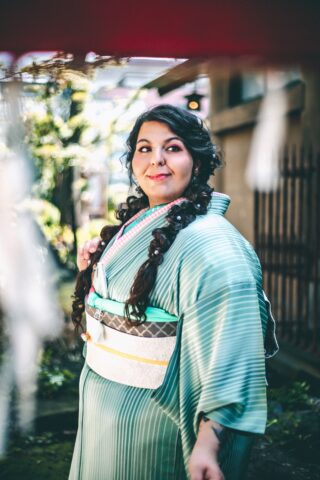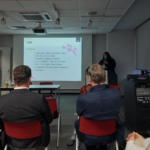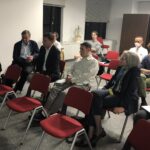
Download
Venue
DIJ Tokyo (access)
Registration Info
This is a past event. Registration is no longer possible.
DIJ Mailing Lists
Please subscribe below to stay informed about our research activities, events & publications:
The Diversity of Japanese Churches: Examining Differences and Similarities in their Socio-Spatial Arrangements
June 1, 2023
Dunja Sharbat, Ruhr-University Bochum
Presentation slides (PDF) © Dunja Sharbat
Ever since the Catholic mission to Japan in the 16th century, Christianity has upheld its presence in the Japanese society – sometimes more pronounced, sometimes less. The numbers of adherents to Christian denominations are relatively small, yet, there is a variety of Christian churches and traditions spread all over the archipelago. And while many churches such as the Japanese Lutheran Church are still connected to Christian (missionary) organisations overseas, there are a few Japanese (indigenous) churches founded by Christian intellectuals that aimed for an independent development of Japanese Christianity without the influence of Western actors (Mullins 1998). Examples are Uchimura Kanzo’s “Nonchurch movement”, Koike Tasuo’s “Japan Ecclesia of Christ” or the “Zion Christian Church” (Kishida Aiji). These independent churches are known for their history, their theological and intellectual approaches to Christian ethics and society (Mullins 2003; Takeuchi 2014), but their contemporary situation and materiality have not received distinct attention yet.
Dunja’s talk introduced her dissertation project in the field of contemporary Japanese Christianity which is based on on-going fieldwork in various Japanese congregations, incl. the Spirit of Jesus Church and the Holy Ecclesia of Jesus. Inspired by the material turn (Miller 2005; Vasquez 2010) and its attentiveness for things, fabrics, and architecture in order to understand the multimodality of social, religious, and cultural setups, Dunja’s talk focused on the materiality of Japanese independent churches and the social practices of believers in present-day Japan. Considering the history and current situation of these churches, she discussed their socio-spatial arrangements and compared it to other Japanese churches in order to analyse differences and similarities in their materiality. The talk was followed by lively discussion about the theoretical distinction between so called indigenous and Western churches in Japan; the different styles of churches (Japanese or Western style); the demographic of the believers; and the churches’ struggle to recruit younger people.
Dunja Sharbat is a PhD candidate at Ruhr-University Bochum. She studied Japanese Studies and Religious Studies at Bochum and Fukushima University. Working with methods from both disciplines, her research on Japanese religion, contemporary religiosity, space and popular culture is based on a mixed-methods approach including qualitative research and image analysis. She currently works on her dissertation about atmosphere in Japanese Christian spaces.



